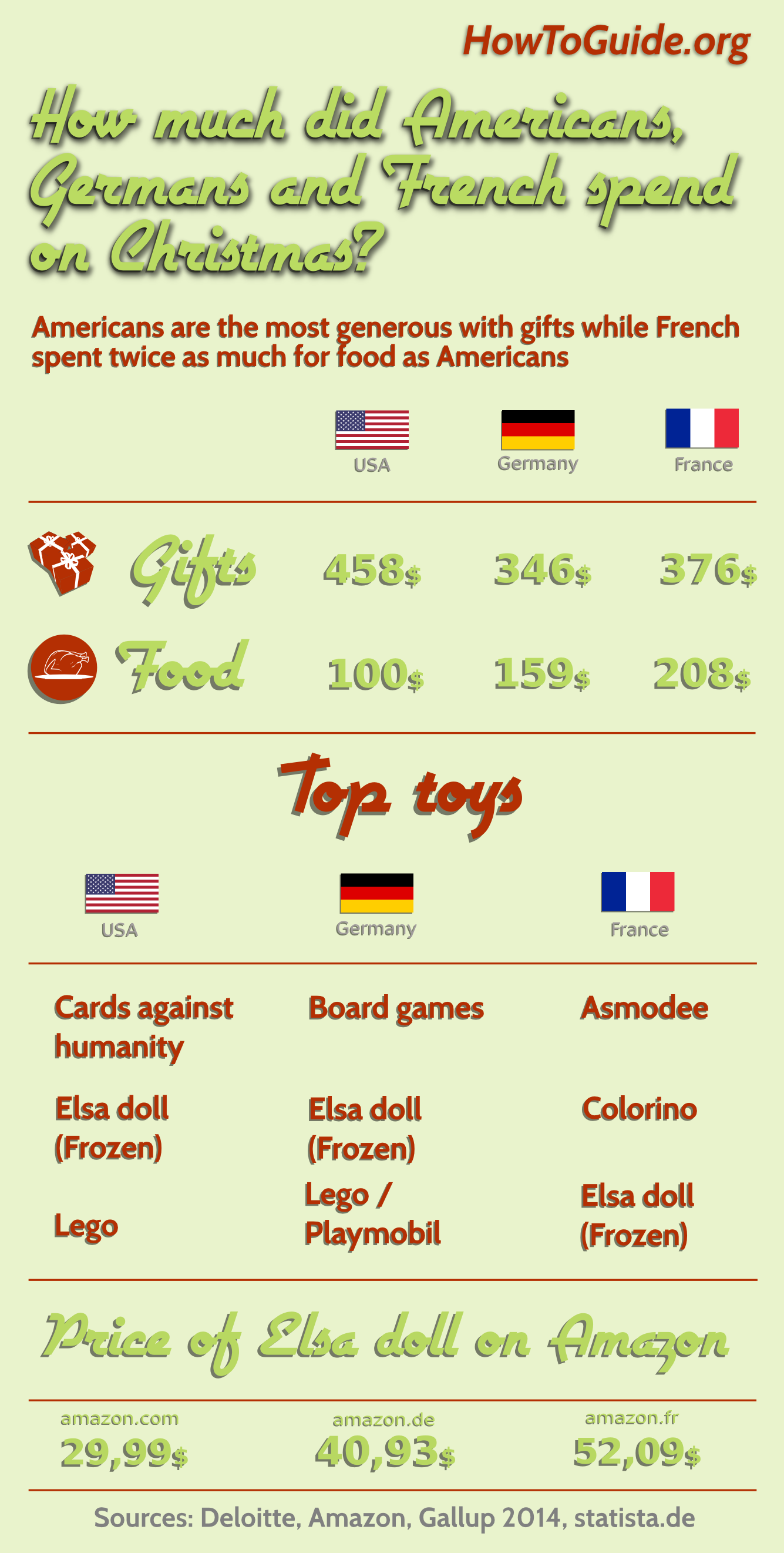
The last Christmas survey from Deloitte highlighted Christmas spending around the world. This year, Americans plan to spend more than twice as much as the French and nearly 3 times more than Germans. Do you have any idea why? I’m not sure I do!
According to Deloitte, a leading tax and audit company, in 2017 Americans plan to spend $1,226—on average—for Christmas. In contrast, Germans plan to spend only $484, and the French intend to spend $538. Holiday budgets include presents, food, socializing, and traveling. In the US, gifts represent only a third of the average holiday budget. But, with 14.7 presents per person, Americans also surpass the French (11.3) and the Germans (8.9).
Of course, I initially thought that this finding was—like many other American tendencies—an exaggeration. In the States, everything has to be oversized, tremendous, and a-ma-zing. Naturally, I assumed the principle also applied to Christmas presents. As you can see, even after working internationally for over 20 years, I’m not immune to prejudices!
A second thought brought me closer to the beginning of an explanation. In the last week, I’ve been solicited by classroom parents and after-care parents to make a contribution to teachers and daycare staff. At the same time, I’ve also sent an email to some neighbors, proposing to organize a gift for Belinda, our school-bus driver.
According to a 2017 Care.com survey of more than 1,200 members, 87% of Americans reported giving holiday tips.
Do the French give holiday tips?
Holiday tipping is also a French habit. Service personnel like the local mailman, firefighters, and garbage collectors receive a small tip, usually in exchange for a calendar. The calendars in my youth were pretty simple, and I would choose one with pictures of kittens or flowers to please my mom.
A famous French rugby team offers a calendar that’s certainly an exception to the usual items. Originally created as a marketing tool to improve the image of the Stade Français team as well as highlight rugby in general, the “Dieux du Stade” calendar features semi-nude photographs of athletes. To be completely honest, I’m a big fan!
What about the Germans? Is holiday tipping also a habit?
Tipping for Christmas and New Year’s Eve in Germany happens infrequently. To show appreciation, Germans would rather offer chocolate, homemade Christmas cookies, or even a good coffee.
But, why don’t they tip?
Certain laws and regulations are primarily to blame. Under the Anti-Corruption Law, public servants are forbidden to accept any financial or non-cash gifts.
In the private sector, most companies in Germany have implemented strict compliance programs within the last 10 years. Compliance officers ensure that employees know what they are and are not allowed to do to express appreciation. As a result, most Germans are aware of the compliance requirements and follow them closely.
Some final words
I’ve often stated in this blog that I feel German at work and French at home. However, this holiday season has made me realize that our pre-celebration of Christmas is more German than French. I decorated an Advent wreath myself and put it at our door. I also bought a traditional wreath with 4 candles at the German School’s Christmas market. My daughter, Jasmine, and I have been baking Christmas cookies for weeks, and I bought small presents for my children to celebrate St. Nicholas’ Day earlier in December.
Similarly, holiday tipping is not entirely natural for me. Instead of money or a gift card, I’ve prepared boxes and bags of Christmas cookies that Yann, Pauline, and I will give to the teachers and caregivers we want to thank.
Of course, many other factors could affect the gap in Christmas spending between the US, Germany, and France. I would love to hear your ideas and experiences in the comment section below. (Visitors without Facebook accounts can scroll farther and use the post comment section instead.)
Finally, I wish you all a very merry Christmas!







